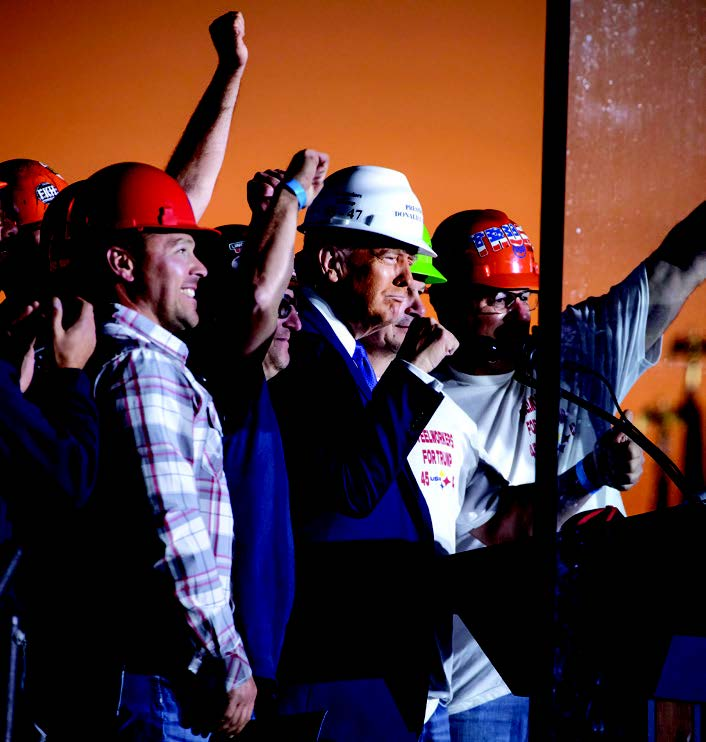
By Paul Krugman
Donald Trump has consistently operated as a fraud. Throughout his business career, he has left a wake of investors who lost money on his failed enterprises while he profited, students who spent thousands on worthless classes, unpaid contractors, and more. Even during his current bid for the presidency, he has been promoting overpriced gold sneakers and Trump Bibles produced in China.
Yet, Trump’s most significant and potentially influential deception has been in the political arena: presenting himself as a unique type of Republican, a champion for working Americans. This self-constructed image has been effective thus far, particularly in securing a notable following among working-class people of color — although the outburst of racism at his recent rally at Madison Square Garden in New York, where a comedian opened with derogatory remarks about Puerto Rico and made a watermelon joke related to a Black individual, may undermine that support in the closing moments of the campaign.
In reality, any divergence in Trump’s policy proposals — or, in certain cases, ideas about policies — from traditional Republican ideology comes from a stance that is even more hostile to labor and favorable to the wealthy than what his party has historically endorsed.
Context: Since the 1970s, our two primary political parties have sharply diverged in terms of economic ideology. Generally, Democrats advocate for higher taxes on the wealthy and a more robust social safety net; Republicans support lower taxes for corporations and wealthy individuals, funded in part by reducing social programs.
Kamala Harris exemplifies a typical Democrat in this context, advocating for tax increases targeting primarily high-income individuals while enhancing tax credits for families with children; she has also suggested expanding Medicare to include home health care for the elderly, which would significantly benefit millions of families.
As a side note: I genuinely struggle to comprehend individuals who assert that Harris hasn’t provided sufficient policy specifics. It seems to me that they are merely seeking something to critique to appear balanced.
Has Trump strayed from established Republican norms? Not significantly during his presidency. His 2017 tax cut overwhelmingly favored high-income earners. Currently, he aims to make that tax reduction, many parts of which are set to expire in 2025, permanent. He has also floated the prospect of a further substantial reduction in corporate taxes (which could, incidentally, primarily benefit foreign investors).
While in office, Trump attempted to push through significant cuts to Medicaid, although he did not succeed. And despite his claims of preserving Social Security and Medicare, his policy proposals would jeopardize the financial viability of these programs.
Trump has also proposed certain tax changes that may sound beneficial to workers but are not, such as eliminating taxes on tips; many tipped employees do not earn enough to pay income taxes, and those who do are primarily in lower tax brackets.
If Trump has deviated from standard Republican economic policy, it’s by amplifying efforts to shift wealth upwards. He is proposing higher taxes on the working class through a substantial national sales tax — which is essentially what his tariffs would amount to. This tax would be deeply regressive — placing a heavy burden on middle- and lower-income households while having a minimal effect on the wealthiest 1%.
If you were to chart the projected impacts of the Harris and Trump tax proposals against one another, they would essentially be inverse images. Trump would increase taxes for the majority of Americans, with only a small fraction of the top earners benefiting; Harris would do exactly the opposite.
Therefore, no, Trump is not a supporter of working-class Americans; on the contrary. So why do millions hold a different belief?
Part of this likely reflects underlying racial tensions: White men without college degrees have seen a decline in their status relative to other demographic groups since 1980, and some, unfortunately, likely resonate with the racism and misogyny exhibited during the event at Madison Square Garden. However, as mentioned, some Latino and Black Americans also seem to have bought into Trump’s narrative. Why?
Well, many Americans accurately recall Trump’s economy before the pandemic as a time of robust job creation and increasing wages — largely, I contend, because Republican lawmakers relaxed fiscal constraints following a period of austerity that slowed recovery during the Obama administration after the 2008 financial crisis. Many also tend to undervalue or forget the high unemployment in Trump’s final year in office. They still feel the sting of rising prices, a consequence of the inflation surge from 2021-22 — despite the fact that this surge was a global phenomenon triggered by the pandemic, and wages adjusted for inflation are currently higher than they were just before COVID-19 struck.
What few seem to grasp is that if he succeeds next week, Trump’s anti-labor agenda will be far more expansive than anything he could implement from 2017-21. At that time, he raised average tariffs on Chinese goods by about 20 percentage points, yet China represented only around 15% of U.S. imports; currently, he is discussing imposing similar tariffs broadly, with 60% targeted at Chinese imports. Altogether, we’re considering a sales tax approximately 10 times larger than his previous initiative.
Thus, Trump is certainly not a pro-working-class ally. If many still believe the opposite, they are simply the latest individuals to fall victim to his extensive career as a con man.
